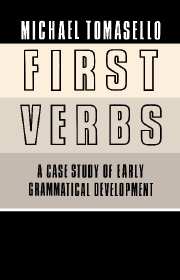Book contents
- Frontmatter
- Contents
- Acknowledgments
- Dedication
- 1 Introduction
- 2 In the beginning was the verb
- 3 Methods and an introduction to T's language
- 4 Change of state verbs and sentences
- 5 Activity verbs and sentences
- 6 Other grammatical structures
- 7 The development of T's verb lexicon
- 8 The development of T's grammar
- 9 Language acquisition as cultural learning
- References
- Appendix
- Index
2 - In the beginning was the verb
Published online by Cambridge University Press: 18 December 2009
- Frontmatter
- Contents
- Acknowledgments
- Dedication
- 1 Introduction
- 2 In the beginning was the verb
- 3 Methods and an introduction to T's language
- 4 Change of state verbs and sentences
- 5 Activity verbs and sentences
- 6 Other grammatical structures
- 7 The development of T's verb lexicon
- 8 The development of T's grammar
- 9 Language acquisition as cultural learning
- References
- Appendix
- Index
Summary
In this chapter I lay out more specifically the goals and hypotheses of the study. In a first section I consider children's early verbs as lexical items, first with respect to their underlying cognitive structures and then with respect to the learning processes by which they are acquired. In a second section I focus on children's earliest sentences, first with attention to the role of verbs and their associated conceptual structures in these sentences and then with attention to the developmental processes by means of which more abstract syntactic categories are formed. I conclude with an explicit listing of the goals and hypotheses of the study.
Children's first verbs
Children's early vocabularies often show a preponderance of object labels and other words that adults categorize as nouns – sometimes called nominals (Gentner, 1982). Recent studies, however, have found that nonnominal expressions (including some adult verbs) are present from the very earliest stages of the language development of many, if not most, children (e.g., Barrett, 1983; Gopnik, 1981, 1988; Tomasello & Farrar, 1984; see Gopnik & Meltzoff, 1987, for a review). Some children are even reported to learn nonnominals first and to rely on them quite heavily in their early language (e.g., Adamson & Tomasello, 1984; Bloom, 1973; Gopnik, 1981, 1988), and this pattern may in fact be statistically predominant in children learning languages such as Japanese and Korean in which nouns are less communicatively important than they are in English (Clancey, 1985; Gopnik & Choi, 1990). Young children can be trained to acquire some types of nonnominal expressions at the same early stage of development that they can be trained to acquire nominals (Tomasello & Farrar, 1986a).
- Type
- Chapter
- Information
- First VerbsA Case Study of Early Grammatical Development, pp. 9 - 29Publisher: Cambridge University PressPrint publication year: 1992



